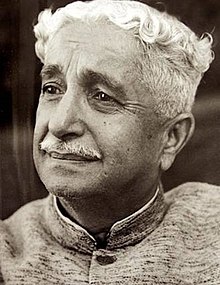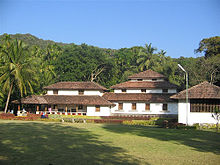Kuvempu | |
|---|---|
 Kuvempu in the 1940s | |
| Born | Kuppalli Venkatappa Puttappa 29 December 1904 Hirekodige, Koppa, Chikmagalur, Kingdom of Mysore (now in Karnataka)[1] |
| Died | 11 November 1994 (aged 89) Mysore, Karnataka, India |
| Pen name | Kuvempu |
| Occupation | Poet, novelist, playwright, academic |
| Language | Kannada |
| Genre | Fiction, drama |
| Literary movement | Navodaya |
| Notable awards | Karnataka Ratna (1992) Padma Vibhushan (1988) Jnanapith Award (1967) Padma Bhushan (1958) Sahitya Akademi Award (1955)[2] |
| Spouse |
Hemavathi (m. 1937–1994) |
| Children | 4, including Poornachandra Tejaswi |
Kuppalli Venkatappa Puttappa (29 December 1904 – 11 November 1994),[3] popularly known by his pen name Kuvempu// , was an Indian poet, playwright, novelist and critic. He is widely regarded as the greatest Kannada poet of the 20th century.[4][5][6][7][3][8] He was the first Kannada writer to receive the Jnanpith Award.[9]
Kuvempu studied at Mysuru University in the 1920s, taught there for nearly three decades and served as its vice-chancellor from 1956 to 1960. He initiated education in Kannada as the language medium. For his contributions to Kannada Literature, the Government of Karnataka decorated him with the honorific Rashtrakavi ("National Poet") in 1964 and Karnataka Ratna ("The Gem of Karnataka") in 1992. He was conferred the Padma Vibhushan by the Government of India in 1988. He penned the Karnataka State Anthem Jaya Bharata Jananiya Tanujate.

Kuvempu was born in Hirekodige, a village in Koppa taluk of Chikmagalur district and raised in Kuppalli, a village in Shivamogga district of the erstwhile Kingdom of Mysore (now in Karnataka) into a Kannada-speaking Vokkaliga family.[7] His mother Seethamma hailed from Koppa, Chikmangalur, while his father Venkatappa was from Kuppali, a village in Thirthahalli taluk (in present-day Shimoga district), where he was raised.[10][7] Early in his childhood, Kuvempu was home-schooled by an appointed teacher from South Canara.[citation needed][11] He joined the Anglo-Vernacular school in Thirthahalli to continue his middle school education. Kuvempu's father died when he was only twelve. He finished his lower and secondary education in Kannada and English languages in Thirthahalli and moved to Mysore for further education at the Wesleyan High School. Thereafter, he pursued college studies at the Maharaja College of Mysore and graduated in 1929, majoring in Kannada.[12]
Kuvempu married Hemavathi on 30 April 1937. He was forced into enter marital life on this faculty out of Ramakrishna Mission.[13] Kuvempu has two sons, Poornachandra Tejaswi and Kokilodaya Chaitra, and two daughter, Indukala and Tharini. Tharini is married to K.Chidananda Gowda the former Vice-Chancellor of Kuvempu University.[13] His home in Mysore is called Udayaravi. His son Poornachandra Tejaswi was a polymath, contributing significantly to Kannada literature, photography, calligraphy, digital imaging, social movements, and agriculture.[13]
Kuvempu began his academic career as a lecturer of Kannada language at the Maharaja's College in Mysore in 1929. He worked as an assistant professor in the Central college, Bangalore from 1936. He re-joined Maharaja's college in Mysore in 1946 as a professor. He went on to become the principal of the Maharaja's college in 1955. In 1956 he was selected as the Vice-Chancellor of Mysore University where he served till retirement in 1960. He was the first graduate from Mysore University to rise to that position.[8]